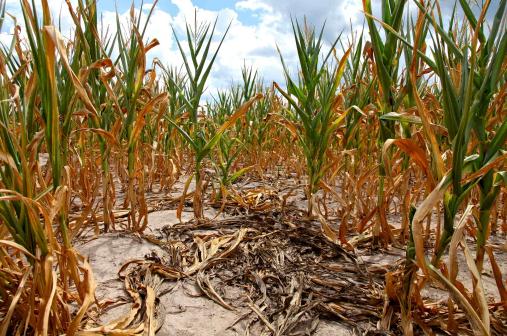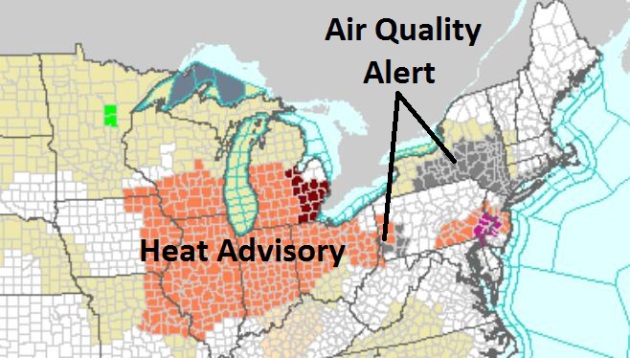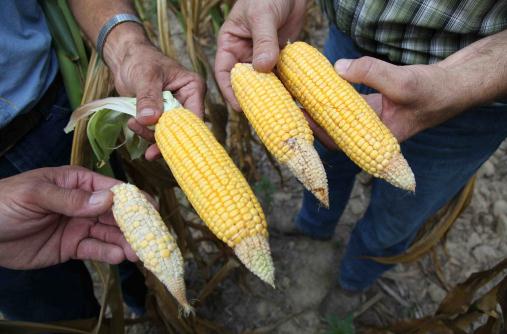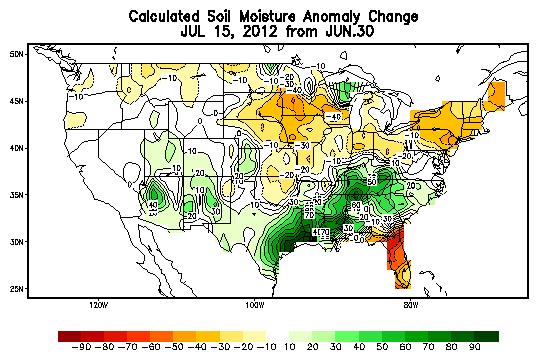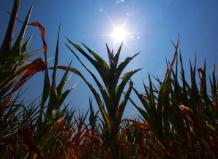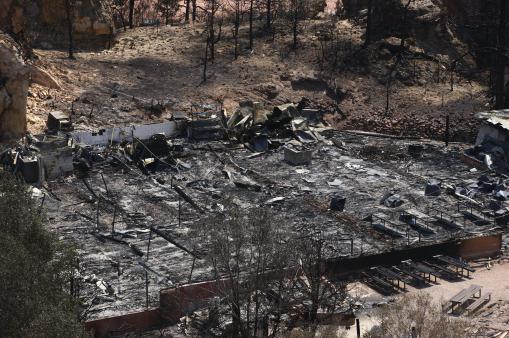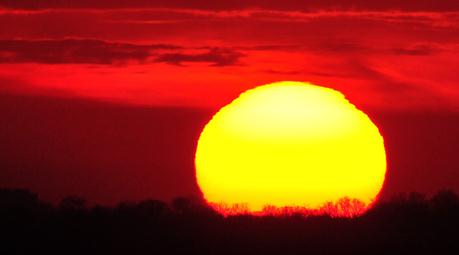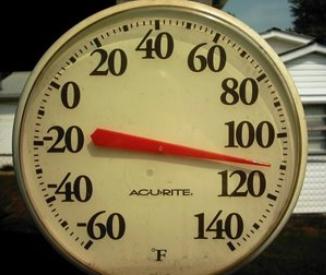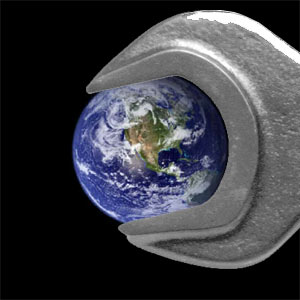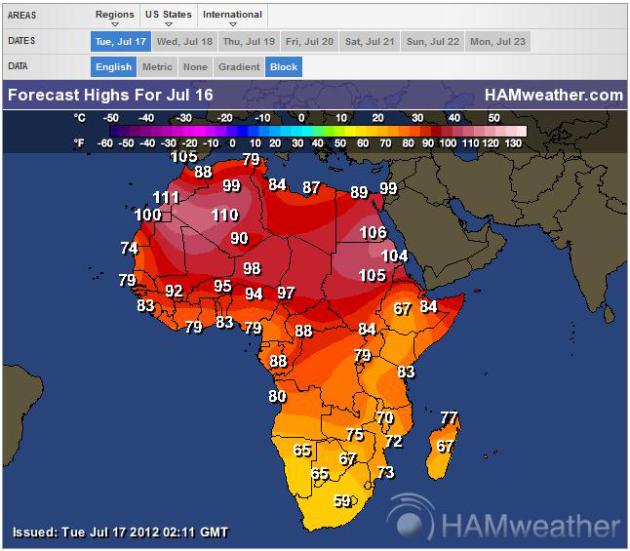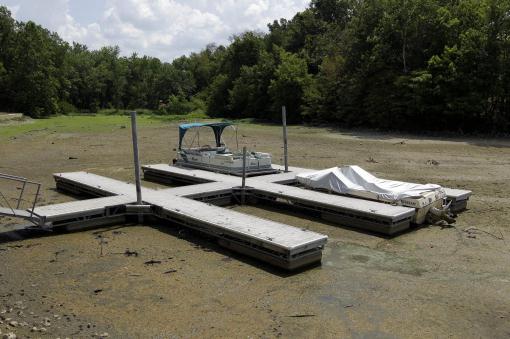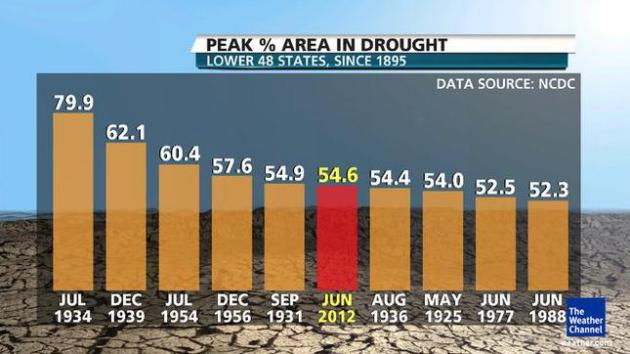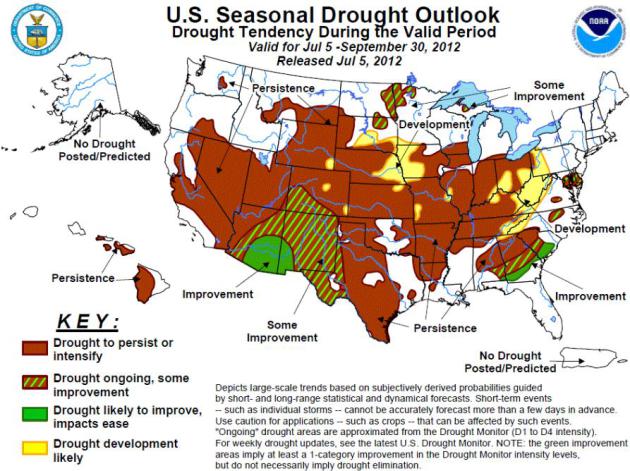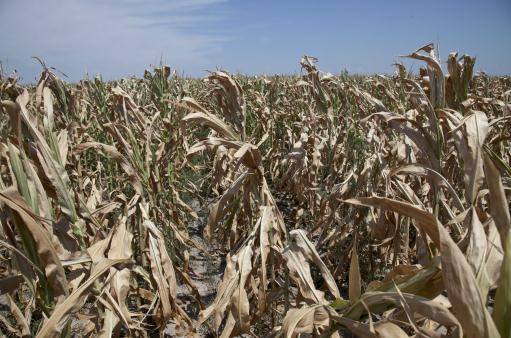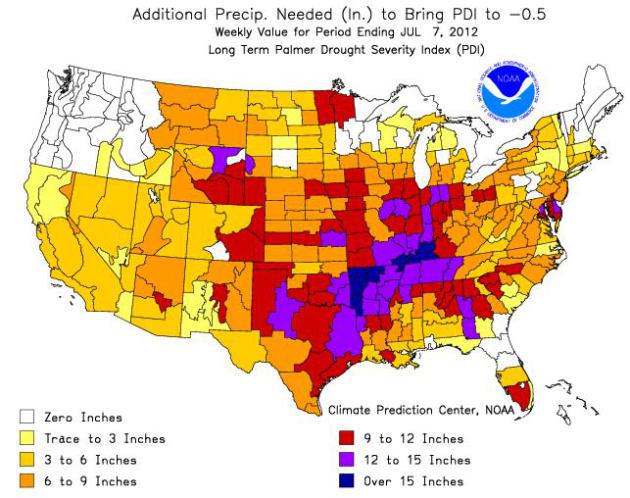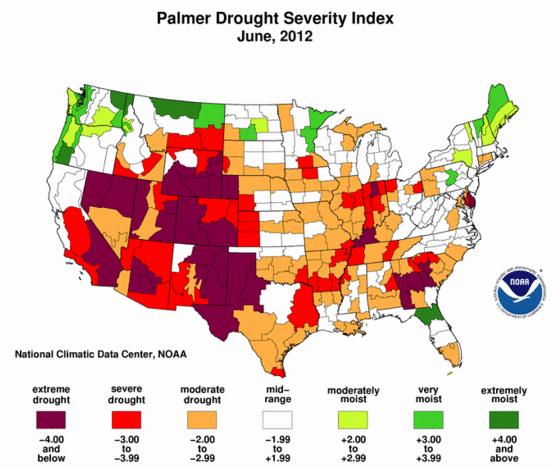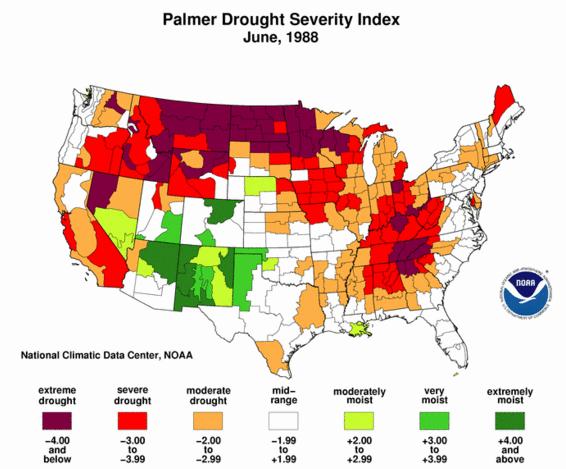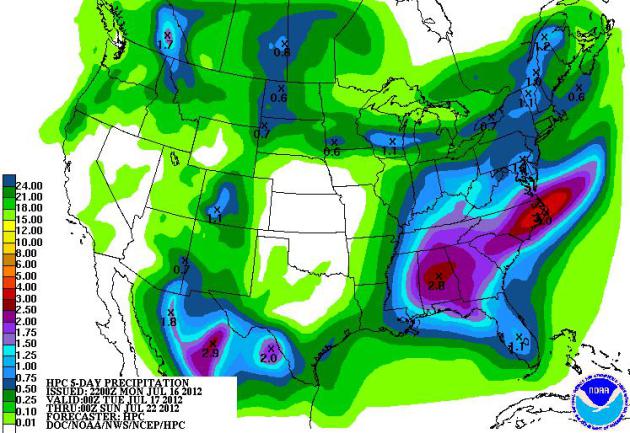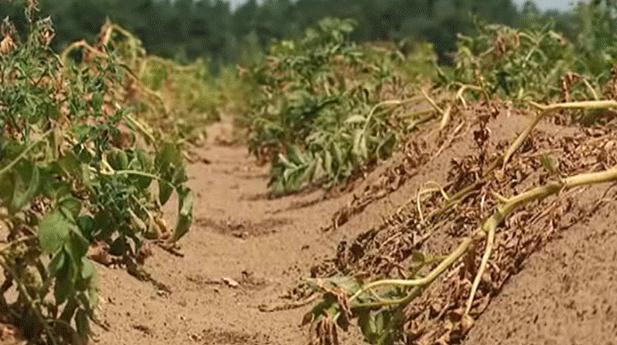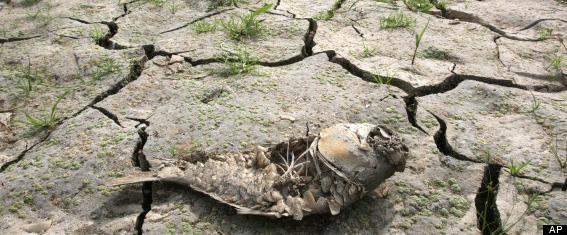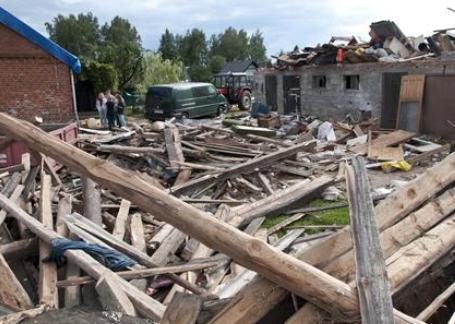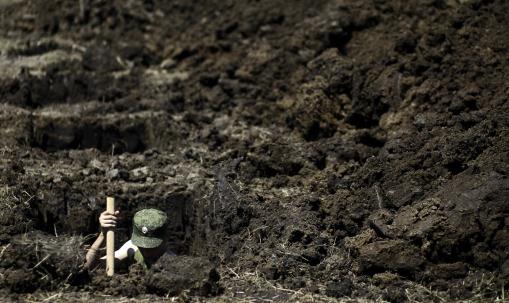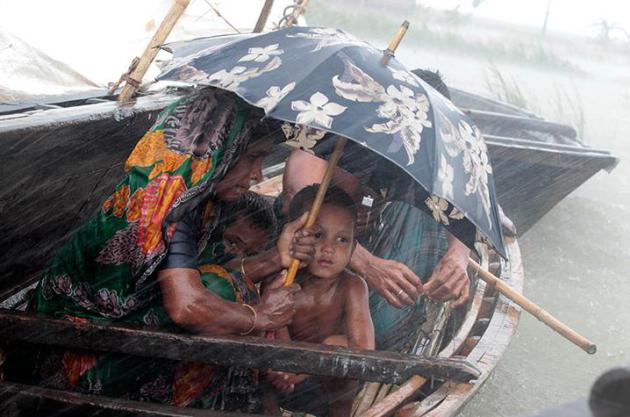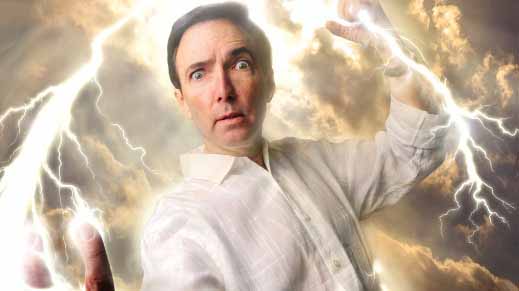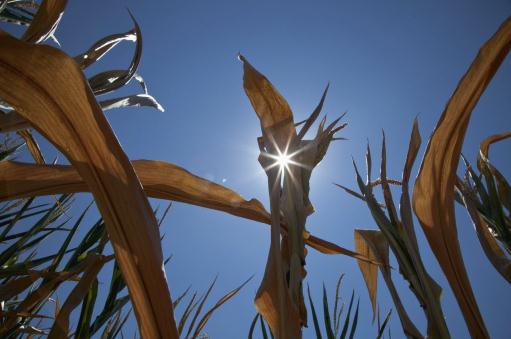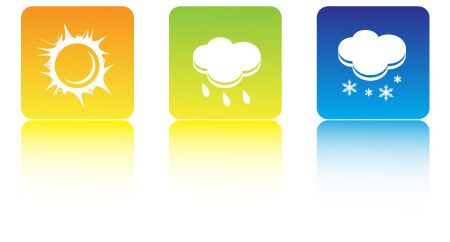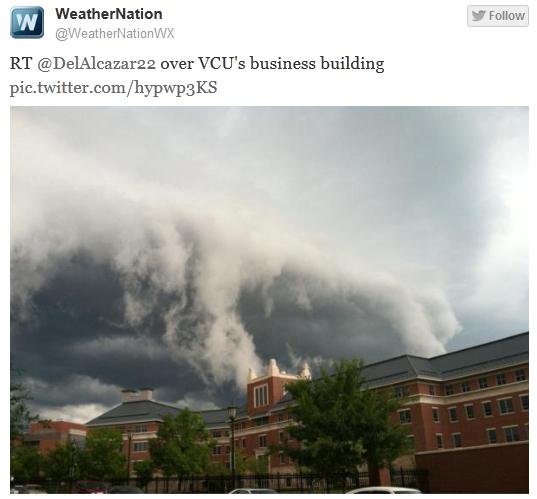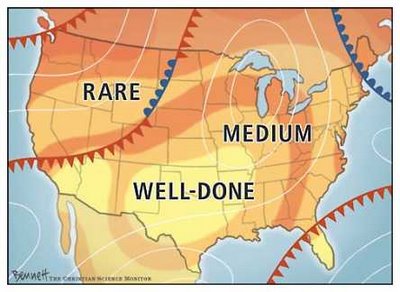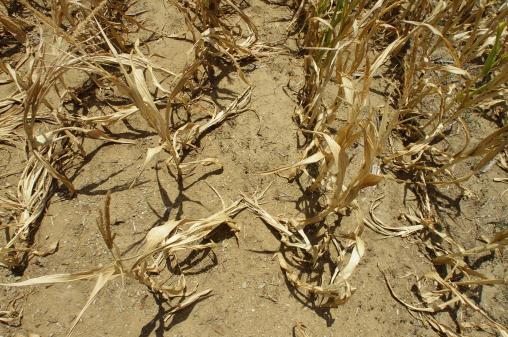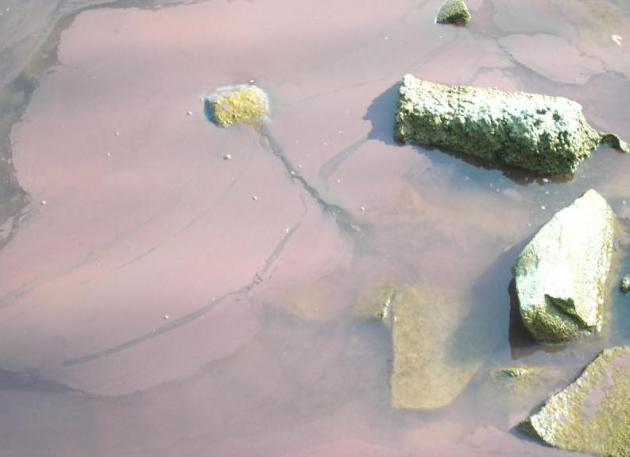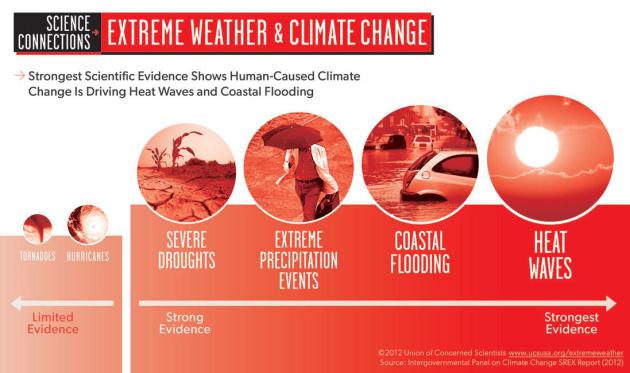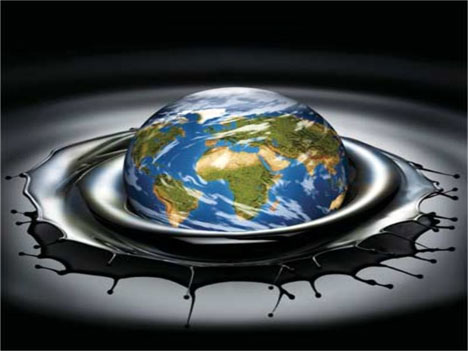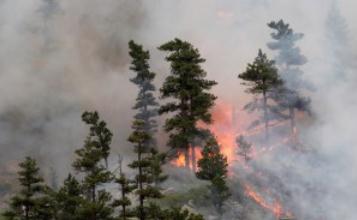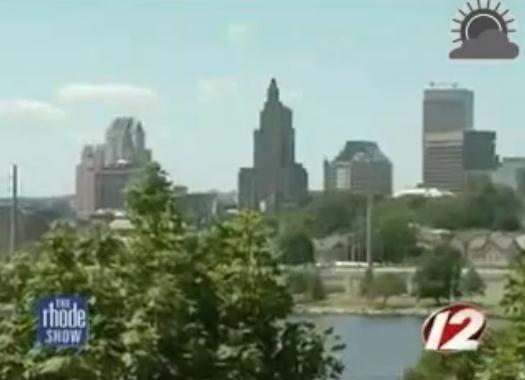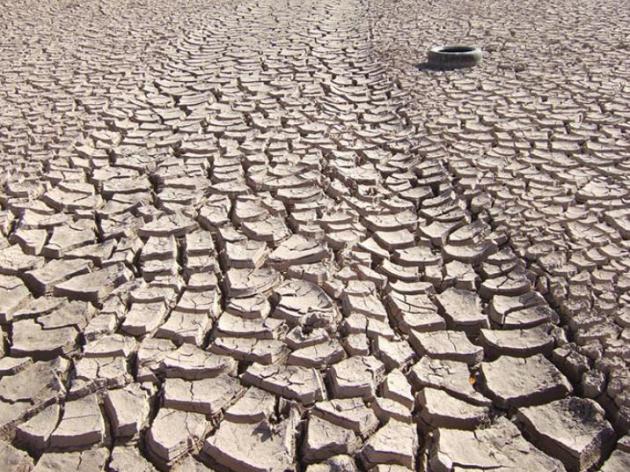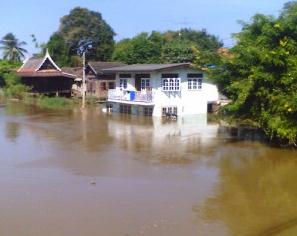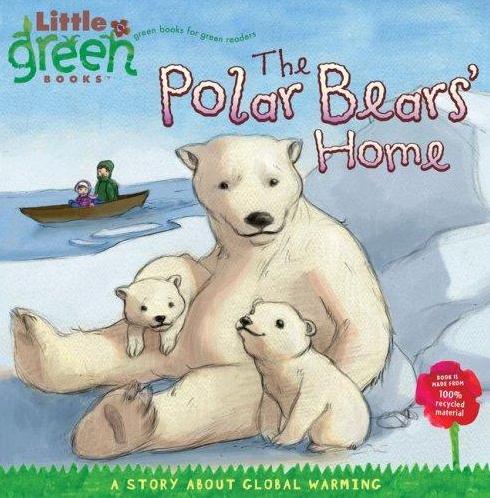55% of USA is in moderate drought (or worse). That's the highest percentage since 1956. Details below.
71% of America characterized as "abnormally dry" or worse, twice as large an area of dry weather as last year at this time.
"Illinois Gov. Pat
Quinn called it a "natural disaster of epic proportions." "We've never
see a drought like this and we have to make sure we do something about
it," he said." - from CNN; more details below.
Photo credit above: "Burnt
stalks lie on the ground among rows of corn damaged by drought in a
parched field in Louisville, Ill. on Monday, July 16, 2012. Over ten
days of triple digit temperatures with little rain in the past two
months is forcing many farmers to call 2012 a total loss. Rows of corn
sit under high temperatures, burning and crisping until the stalks
eventually fall, burning into the dry soil." (AP Photo/Robert Ray)
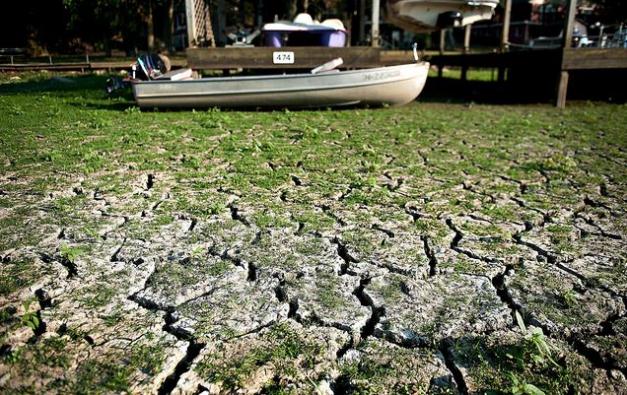
Worst-In-Generation Drought Dims Farm Hopes. A $50 billion drought? Here's an excerpt of an ominous article from
Bloomberg Businessweek: "
Cloudless skies seldom look so
ominous. A worst-in-a-generation drought from Indiana to Arkansas to
California is damaging crops and rural economies and threatening
to drive food prices to record levels. Agriculture, though a
small part of the $15.5 trillion U.S. economy, had been one of
the most resilient industries in the past three years as the
country struggled to recover from the recession. “It might be a $50 billion event for the economy as it
blends into everything over the next four quarters,” said
Michael Swanson, agricultural economist at Wells Fargo & Co. (WFC) (WFC) in
Minneapolis, the largest commercial agriculture lender.
“Instead of retreating from record highs, food prices will
advance.”
Photo credit above: "The dry section of the Morse Reservoir, one of three reservoirs which
supply water to nearby Indianapolis, in Cicero, Indiana,on July 12,
2012." Photographer: Daniel Acker/Bloomberg
Heat Shifts South And East. Advisories for excessive
heat (and humidity) are still in effect from eastern Iowa eastward to
Chicago, Indianapolis and Columbus - Excessive Heat Warnings posted for
Detroit. Air quality is poor - high levels of ozone for much of New York
State. Map:
NOAA.
Biggest Drought Since 1956, Climate Agency Says.
CNN.com has the story; here's an excerpt: "
The
pool is closed in Warrenton, Missouri. Cattle ponds are drying up in
Arkansas. Illinois is in danger of losing its corn crop. Even the mighty
Mississippi River is feeling low amid what the National Climatic Data
Center reported Monday is the largest drought since the 1950s. The
center said about 55% of the country was in at least moderate
short-term drought in June for the first time since December 1956, when
58% of the country was in a moderate to extreme drought."
Photo credit above: "
Stalled corn is displayed on a farm
in Geff, Ill on Monday, July 16, 2012. 53-year-old farmer David White
says he has never experienced such extreme drought. Little rain and
long lasting heat has dried up his acres forcing him to declare this
year a "total loss." (AP Photo/Robert Ray)
Worrying Trends. NOAA's
CPC,
Climate Prediction Center, shows a roughly 40-50% drop in soil moisture
from June 30 to July 15 over portions of central and southern
Minnesota.
40% of America's corn crop rated "good" or "excellent". Source: USDA. Photo: madison.com.
Colorado fire conditions currently similar to what you would normally find in September. Source: CNN. Photo credit above: "
Remains of Flying W Ranch in Colorado Springs." Matthew Staver/The New York Times.
"
There's no rain and all that heat demands evaporation ... it's almost as if the atmosphere has forgotten how to rain." - from a CBC article; details below.
"The global warming debate will be much easier to embrace without the threat of government expansion." - excerpt from a post at deathrattlesports.com below.
Perils And Promise Of Geoengineering. Is there a planet-wide, technological "fix" for a warming atmosphere? The story below.
Extended Outlook: Not As Blazing. The latest
European (ECMWF) model run has backed off on the late-week heat spike.
After a few (welcome) days in the 80s Wednesday and Thursday, we should
warm close to 90 by next weekend, maybe some mid 90s returning by
Wednesday of next week.
You Think It's Hot Here? Andrew Rosenthal from Earth Networks shared some recent high temperatures across northern Africa. Extremely toasty:
Marrakesh, Morocco: 120
Tindouf, Algeria: 117
Beni Abbes, Algeria: 113
In Salah, Algeria: 113
Gassim, Saudi Arabia: 115
Abdaly, Kuwait: 120
Amarah, Iraq: 117
Karbalaa, Iraq: 113
* map above courtesy of
Ham Weather.
Boating Optional. Drought is deepening, with the Corn Belt hardest hit. Here are the details of the photo above: "
Boats
sit on the bottom in a dry cove at Morse Reservoir in Noblesville,
Ind., Monday, July 16, 2012. The reservoir is down nearly 6 feet from
normal levels and being lowered 1 foot every five days to provide water
for Indianapolis." (AP Photo/Michael Conroy)
2012 Drought Rivals Dust Bowl. Some perspective is
in order - the Drought of '12 is already among the Top 10 Worst Droughts
in U.S. history - many experts believe it may inevitably rival the
severe droughts of the Dust Bowl era. Details from
weather.com: "
This
year's drought ranks among the 10 largest drought areas of the past
century, the National Climatic Data Center is expected to announce
today. Preliminary data computed from the Palmer Drought Severity Index
shows that 54.6 percent of the contiguous 48 states was in drought at
the end of June, the highest percentage since December 1956, and the
sixth-highest peak percentage on record. Monday's State of the Climate
drought report from NCDC is expected to show that since 1895, only the
extraordinary droughts of the 1930s and 1950s have covered more land
area than the current drought. And by a slight margin, the current
drought actually covers more area than the famous 1936 drought, though
other droughts in the Dust Bowl years – particularly the extreme drought
of 1934 – still rank higher."
Latest Drought Outlook From NOAA. Some improvement
is possible over the Red River Valley in the coming weeks, but the
drought is forecast to get worse over southwestern Minnesota and western
Iowa. A full-screen version of this map is
here.
Debilitating Drought. The worst of the drought stretches from Indiana west to Kansas and Nebraska. Photo credit: "
Corn is distressed and yellowing in a drought near Grand Island, Neb., Saturday, July 14, 2012." (AP Photo/Nati Harnik)
NOAA Palmer Index. The
map above
shows the amount of rain necessary to alleviate the drought, over 15"
for portions of the Middle Mississippi and Ohio River Valley; 9-12" for
south central Minnesota and much of the Red River Valley. More details
from NOAA: "
The 2012 drought is expected to have a major impact
through the remainder of this year. Much of the nation has been placed
in drought status, with severe drought expanding in the central United
States. With rainfall deficits continuing to build each day, the
long-term prognosis is that this drought may take some time to weaken.
Projections by the Climate prediction center estimate Kansas and
Missouri will need in excess of 9 to 12 inches of rain to alleviate all
drought symptoms. The images below represent the latest drought status
in the country as well as the estimated precipitation requirements to
return the area to normal soil moisture conditions."
Palmer Comparison: 2012 vs. 1988. This summer bears a
striking resemblance to 1988, when much of America experienced the
worst drought since the Dust Bowl Days of the 1930s. This summer the
drought is worse over the Rockies and Southwest, not as bad (yet) over
the northern tier states of the USA. Map courtesy of
NOAA.
Driest Month On Record: August, 1934. Hopefully
things won't get this bad - the Palmer Index above showed much of
America in extreme drought during August of 1934. Source:
NOAA.
Drought Deepens Over Central Plains. Little or no
rain is expected through Sunday from Nebraska south to Dallas. Soaking
T-storms may spark some 2-4" rains from Huntsville to the Outer Banks of
North Carolina. Any rain over the Upper Midwest will be spotty - a few
isolated T-storms possible as slightly cooler, Canadian air seeps south
of the border. Map:
NOAA HPC.
Drought In Central, Eastern Canada Baking Crops. Yes, even southern Canada is being impacted by a growing drought, pushing north out of the USA. The
CBC (Canadian Broadcasting Corporation) has more details: "
Most
of Central and Eastern Canada is experiencing extreme heat and little
rain causing drought conditions, a senior climatologist with
Environment Canada says. "I'm call it a drought, no question about it,"
David Phillips told the CBC News Network in an interview Sunday
afternoon. "Besides the lack of precipitation, there is just this hot
weather and it's like a double whammy," Phillips said. "There's no rain
and all that heat demands evaporation ... it's almost as if the
atmosphere has forgotten how to rain." That could mean shoppers might
see the price of produce go up." (Photo: CBC).
Korean Drought Worst In A Century For North And South Korea. Some unsettling details from
Huffington Post; here's an excerpt: "
KOHYON-RI,
North Korea — North Korea dispatched soldiers to pour buckets of water
on parched fields and South Korean officials scrambled to save a rare
mollusk threatened by the heat as the worst dry spell in a century
gripped the Korean Peninsula. Parts of both countries are experiencing
the most severe drought since record-keeping began nearly 105 years
ago, meteorological officials in Pyongyang and Seoul said Tuesday. The
protracted drought is heightening worries about North Korea's ability
to feed its people. Two-thirds of North Korea's 24 million people faced
chronic food shortages, the United Nations said earlier this month
while asking donors for $198 million in humanitarian aid for the
country."
Photo credit above: "
A dead fish lies on the cracked bed
of a reservoir due to a severe months-long drought on the Korean
Peninsula, in Bongdam in Seoul, South Korea, Tuesday, June 26, 2012." (AP Photo/Ahn Young-joon)
Freak Wave Of Deadly Tornadoes Sweeps Poland. Here's an excerpt of a story (with video) from
USA Today: "
At least one person was killed and 10 injured in freak wave of tornadoes that swept northern and western Poland,
the BBC reports. At least 100 homes were destroyed in Kujawy-Pomorze
and Wielkopolska provinces in Sunday's unsually severe weather."
The Flood That Changed Russia. Here's more on the recent deadly flooding and aftermath that has created a huge outcry across Russia - from the
New York Times: "
MOSCOW
— The week following a catastrophe always feels long: it packs enough
emotions for a few months or a year. We Russians know this because
catastrophes are regular events here. In the week since the southern
town of Krymsk was devastated by a flood, we have witnessed
transformations that under different circumstances might have taken
months or years to transpire. What happened in Russia over the last
week is grassroots organizing on a mass scale. This had never happened
here before. In Moscow alone, within 48 hours of the tragedy, people at
more than a half dozen locations were collecting large amounts of aid
for the survivors in Krymsk. Clothes, bedding, medication, drinking
water and money were gathered in amounts that required fleets of trucks
and airplanes to transport. Those trucks and the airplanes also
materialized somehow, as did the buses that took hundreds of young volunteers to Krymsk to help with the rescue efforts."
Photo credit above: "
A soldier digs a grave for those who
died during floods in Krymsk, about 1,200 kilometers (750 miles) south
of Moscow, Tuesday, 10, 2012. Intense flooding in the Black Sea region
of southern Russia killed nearly 170 people after torrential rains
dropped nearly a foot of water, forcing many to scramble out of their
beds for refuge in trees and on roofs, officials said Saturday." (AP Photo/Sergey Ponomarev)
Flooding Around The World - In Pictures.
The Guardian
has an amazing (and heart-wrenching) series of photos showing the
impact of severe floods worldwide. While much of the Northern Hemisphere
fries, extreme rains continue to take a toll: "
While the UK has
been affected by unusually heavy rain and flooding, many parts of the
world often struggle with monsoon rains and flash floods causing severe
damage and loss of life."
Photo credit: "
Kurigram, Bangladesh:
a woman sits with children in a boat as heavy rain batters a flooded
village. At least 100 people have died and hundreds of thousands are
marooned across Bangladesh." Photograph: Andrew Biraj/Reuters
"Ask Paul". Weather-related Q&A:
Paul:
"Are there studies that tell the differences
between corn, other ag crops , prairie and forest in regard to humidity
and dew point? Does intense corn production adversely affect weather?"
Rudi Hargesheimer
Rudi- first, I want to go on record as saying that
I'm pro-corn. There is nothing better than sweet corn, and I don't take
America's corn farmers for granted. No way I could do what they do on a
regular basis. There is a possible connection between corn and higher
moisture levels (and dew points). At night corn "sweats", it releases
moisture. As we've been able to plant corn rows closer together with
improving farming techniques the amount of "evapotranspiration" has
spiked in recent years. Some days the dew points in Iowa and southern
Minnesota are higher than along the Gulf Coast, the source of our summer
moisture. How can that be? Something is putting more water into the
atmosphere, and the most likely answer is (sweaty) corn. I'm not aware
of a direct impact from beans or other crops, but corn may be
(accidently) spiking our heat indexes and providing more fuel for severe
thunderstorms. Go figure. (Photo: AP Photo/Nati Harnik)
"Paul - I wonder what scientists would say is
the answer to the conundrum where everywhere you look, towns and
villages are being washed away (last story was NE India), and yet most
of the USA is in a drought state. We had the wettest May in decades, yet
the drought map doesn't seem to show it. Surely by now southern China
isn't suffering from drought."
Jim Mork
Jim - your question is a good one. It's a real
paradox: how can a world tipping toward (more frequent/intense) drought
be experiencing an uptick in 1-in-100 and even 1-in-500 year floods? The
extremes seem to be getting even more extreme. The reality: a warmer
atmosphere means normally dry areas will get drier, and wet areas may
get wetter, but if you wam background temperatures, even by a few
degrees, it increases evaporation rates and increases the risk of even
wet areas slipping back into drought. Yes, it's a bit counter-intuitive. I
asked a few climate scientists for their thoughts:
"
Warmer soils means more evaporation, i.e. more loss of water
from the soil. So even if regions that get *more* precipitation can see
worsened drought. And indeed, that's what the models project, and that's
what we're seeing."
"Actually
Paul, there is a more fundamental issue here. if you look at IPCC
projections (e.g. AR4 maps of precip and of drought) there at first
seems to be an inconsistency. The precip map shows some robust regions
of increased as well as decreased precip (almost a zero sum game
globally, i.e. canceling differences between large positive and negative
numbers) and yet if you look at e.g. soil moisture, it shows nearly
uniform tendency toward drought over *all* of the continents. This is
something I find useful sometimes to talk about in public lectures,
because it allows you to make a key point in explaining the apparent
discrepancy. Soil moisture/drought is a difference between what comes in
(precip & runoff) and what goes out (evap/evapotransipiration).
And it turns out that the increase in the latter due to warmer soils is
large enough that it even overcomes the precip contribution in regions
that are predicted to get less precip. So there isn't a paradox. IN
many cases, even regions predicted to get more total precip are often
also predicted to see worse drought. And of course, there is also a
seasonal consideration. Drought is worst in summer and evaporative
losses increase non-linearly w/ soil temperature so that even winter
gains will tend not to balance out summer losses..." - Michael Mann, Penn State climate scientist.
"This is only part of the story. Precipitation is inherently intermittent. It is not a continuous variable like temperature. So
one must deal with changes in all aspects: the characteristics: not
just amount, but also frequency, intensity, duration, sequence, type
(rain vs snow etc). With more
water vapor the intensity of events increases but the amount is
controlled by energy flows, especially evaporation, and that changes at a
slower rate than the stage of water vapor rate (Clausius Clapeyron). So as the intensity goes up the frequency/duration has to decrease: more drought and more flooding. So it is not just the increase in evaporation that matters but also the changing character of precipitation. More
rain vs snow is another aspect, and that affects storage and seasonal
cycle and also favors more summer drought as in this year in the West." - Kevin Trenberth, head of the Climate Analysis Section at the USA National Center for Atmospheric Research
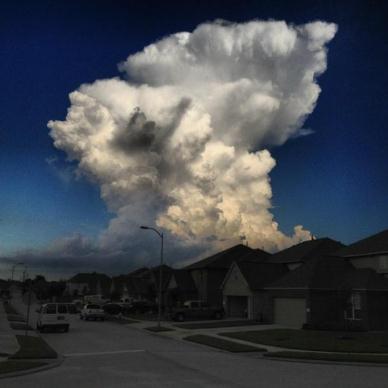
Photo Of The Day: Towering Thunderhead.
Thanks to Scott Kapich, who snapped this photo in Spring, Texas Monday.
It almost looked like the CB (cumulonimbus) was posing for the camera.
Honorable Mention. Thanks to @DelAlcazar22 for passing this along to WeatherNation TV, via Twitter.
Next iPhone Will Debut In Fall, Japanese Blog Reports (Video). If you're an iFan and can't imagine life without your iPhone, check out this entry from
mashable.com: "
If
you’re on the market for a new phone — don’t buy the iPhone 4S just
yet. The sixth-generation iPhone is on its way, according to Japanese
tech blog Macotakara, a popular resource for pre-production news. The
resource successfully predicted
the iPhone 4S release in 2011. The August reports stated the iPhone 4S
and iPad 3 would publicly launch in October that year. The iPhone 4S
did, in fact, launch in mid-October. The new iPad, however, launched a
few months later in March 2012. Macotakara
is citing sources in China. The blog reports the new iPhone could have
a different look than the latest model. The back panel could be
two-toned with glass and aluminum. For more details from the report,
watch the video above." Photo credit
here.
Windchill Please. I received this e-mail, via Terry Sauer at The Star Tribune, and felt compelled to share it with you:
Dear Paul,
"On these overly warm days, with the
temperature pushing 102 degrees, there is no question that it is,
actually, HOT (all capitals.) However,
it would be much easier to bear up under these stressful temperatures
if you would remember to mention the WINDCHILL FACTOR, rather than dwell
on the heat index or the dew point. A temperature of
92 degrees, in the shade with even a slight breeze can be quite
comfortable---even pleasant---because it feels cooler than 92 - perhaps
more like 82, or whatever. Please dumpthe heat index and the dew point and get back the the wind chill factor. This IS Minnesota, after all.
Best regards,"
Bill Tiegs : )
Slow Motion Disaster
Unlike a hurricane or flood - drought builds
slowly, over many weeks. There are no refugees, but impact on the
farming community can be devastating. We are on track for a drought that
may rival, or exceed 1988. Some meteorologists are comparing America's
heat/drought to the 1930s Dust Bowl years.
But there's a disconnect. A reader asked how we
can have severe drought, while extreme floods are making news worldwide?
"Warmer soils means more evaporation, i.e. more loss of water from the
soil. So even regions that get *more* rain can see worsened drought. And
indeed, that's what we're seeing" said climate scientist Michael Mann
in an e-mail.
Most of the rain from violent downpours runs off into streams; it doesn't soak into topsoil.
Farmers take a risk every year; one hailstorm
can ruin an entire crop. Prediction: we'll all be paying more for food
within 4-8 months.
The heatwave building over the Plains is like a
stubborn rubber band: it keeps bouncing "waves" of heat north. Slight
relief through midweek gives way to another heat surge: low 90s may
return by the weekend. The drought will get worse before conditions
improve (a little) by late July.
I don't know about you, but I'm almost looking forward to September.
Photo credit above: "Corn stalks
struggling from lack of rain and a heat wave covering most of the
country are seen Monday, July 16, 2012 in Farmingdale, Ill. The
nation's widest drought in decades is spreading. More than half of the
continental U.S. is now in some stage of drought, and most of the rest
is abnormally dry." (AP Photo/Seth Perlman)
Climate Stories...
Global Warming Harms Lakes. Living in The Land of 10,000 Lakes (actually 16,000 over 2 acres) this article from
Science Daily caught my eye. Here's an excerpt: "
Global
warming also affects lakes. Based on the example of Lake Zurich,
researchers from the University of Zurich demonstrate that there is
insufficient water turnover in the lake during the winter and harmful
Burgundy blood algae are increasingly thriving. The warmer temperatures
are thus compromising the successful lake clean-ups of recent
decades.Many large lakes in Central Europe became heavily overfertilized
in the twentieth century through sewage. As a result, algal blooms
developed and cyanobacteria (photosynthetic bacteria) especially began
to appear en masse. Some of these organisms form toxins that can
compromise the use of the lake water. Dying algal blooms consume a lot
of oxygen, thereby reducing the oxygen content in the lake with
negative consequences for the fish stocks."
Photo credit above: "
In the fall, the body of water
already turns over at a depth of between zero and 20 meters and the
Planktothrix comes to the surface from depths of 15 meters. It can form
visible masses (blooms) at the surface." (Credit: Limnologische Station, UZH)
Infographic: Extreme Weather And Climate Change.
It's all about statistics and probabilities. Which types of weather are
most likely to impacted by rising temperatures, worldwide? Here's an
effective infographic and explanation from UCS,
The Union of Concerned Scientists:
- "What's the connection between global warming and extreme
weather? When it comes to heat waves and coastal flooding, the
scientific evidence is clear: Human-caused climate change is driving
these extreme weather events.
- Other forms of severe weather are also closely linked to
climate change, including a rise in extreme precipitation events in
some regions and increasingly severe droughts in others.
- The effect of climate change on tornadoes and hurricanes is
an active area of research. Scientific confidence with observed data is
currently low, though the underlying mechanisms of climate change are
expected to play a role."
 It's Simple: Global Warming Is Causing The Extreme Weather
It's Simple: Global Warming Is Causing The Extreme Weather.
ABC News environmental reporter Bill Blakemore connects the dots in this story; here's an excerpt: "
We
want a clear answer. Is manmade global warming responsible for the
surge in severe heat events we’re seeing in recent years around the
globe? The world’s climate scientists have a clear answer: Yes. It is.
“It’s about as solid as science ever gets,” climatologist James Hansen
tells ABC News. But climate scientists often add a different and
sometimes confusing answer to a slightly different question: Is manmade
global warming to blame for any one of those extreme weather events? No,
they say — or rather, that’s a somewhat meaningless question if you
mean that too literally, since nothing ever happens for any one reason —
not anywhere, not ever, though there are of course “main causes” or
“triggering events,” factors that may increase the probability of any
one event happening; but any one event still happens only because
various conditions are right at the same time, so you can’t say,
exactly, that any one event is “caused by” manmade global warming — or
any other single cause — not exactly…"
Focusing Science On The Damage. Here's a portion of an Op-Ed at
The New York Times: "...
From
deep water drilling for oil to fracking for gas and arctic mining,
there are no more limits. This is astonishing. But it should also be
alarming. So clever have humans become that we can squeeze what we want
from our planet’s natural systems, seemingly without any limits. But
this is not matched by our ability to control the impacts of our
advances or to live within our means. Worse still, we are tempted by
our successes to exaggerate our power to solve the problems of the
world — that if we really need to, we will be able to. We believe that
our ingenuity, though it may cause some problems from time to time,
will also help us get out of them. Yet the evidence increasingly points
in the opposite direction. Since the United Nations set up the
Intergovernmental Panel on Climate Change (IPCC) in 1988, investment in
technology that could counter global warming has been on a tiny scale
compared to that spent on technology that contributes to expanding
energy usage, and thus emissions..."
Must-See: Best News Report This Year On Link Between Climate Change And Extreme Weather. Here's an except of a must-read article from
Think Progress: "
Last week I wrote that “Every Network Gets Extreme Weather Story Right.” The
ABC News weather editor even ended his story, “Now’s the time we start
limiting manmade greenhouse gases.” But the major networks only devote 3
minutes each to what is in fact the “Climate Story of the Year: Warming-Driven
Drought and Extreme Weather Emerge as Key Threat to Global Food
Security.” Indeed, global warming is the story of the century — and if
we don’t start reducing greenhouse gas emissions ASAP, it will be the
story of the millennium — see NOAA stunner:
Climate change “largely irreversible for 1000 years,” with permanent
Dust Bowls in Southwest and around the globe (if we don’t act quickly).
See also Nature Geoscience: Ocean dead zones “devoid of fish and seafood” are poised to expand and “remain for thousands of years.“
Merkel Warns On Global Warming If No Climate Accord.
Reuters has the story; here's an excerpt: "
Chancellor
Angela Merkel warned on Monday that global warming will accelerate at a
dramatic rate unless leaders reach a deal on limiting greenhouse gas
emissions as soon as possible. After
marathon talks in Durban last December, countries agreed to forge a
new deal by 2015 that would for the first time force all the biggest
polluters to limit greenhouse gas emissions. Critics said at the time, however, the plan was too timid to slow global warming." Photo: Reuters.
Nation's Top Scientists Urge State Department To Consider Climate Change In New Review For Keystone XL Pipeline. Here's an excerpt of a press release from
350.org: "
WASHINGTON,
DC -- Ten of the nation’s top climate scientists released a letter to
Secretary Clinton today, urging the State Department to conduct a
serious review of the climate change impacts of the Keystone XL
pipeline. “At the moment, your department is planning to consider the
effects of the pipeline on ‘recreation,’ ‘visual resources,’ and
‘noise,’ among other factors,” wrote the scientists. “Those are
important—but omitting climate change from the considerations is
neither wise nor credible.” The State Department is currently accepting
comments on the scoping evaluation that will determine what
environmental considerations will be included in the supplemental
environmental impact statement (SEIS) required for the northern leg of
the Keystone XL pipeline."
"It's Time To Reduce Our Fossil Fuel Use Now". Here's a video of the recent story Providence
WPRI-TV meteorologist TJ Del Santo ran on the weather-climate connection and reducing our use of fossil fuels: "
WPRI
meteorologist TJ Del Santo discusses recent extreme weather in the
context of global warming and concludes, ""It's important to try to
reduce our fossil fuel use now, so that the long term won't be as
extreme."
Geoengineering Could Backfire, Make Climate Change Worse.
Why do I feel the only people that will benefit from tinkering with the
atmosphere on a planetary scale are the lawyers? The story from
Wired Science (UK); here's an excerpt: "
Deploying
giant space mirrors and spraying particles from stadium-sized balloons
may sound like an engineer’s wild fantasy, but climate models suggest
that the potential of geoengineering to offset rising atmospheric
carbon dioxide may be significantly overstated. Through a variety of
computer simulations used for reporting to the Intergovernmental Panel
on Climate Change (IPCC), the team investigated a scenario where an
increase in the world’s atmospheric carbon dioxide levels was balanced
by a “dimming” of the sun. Across all four models tested, the team
showed that geoengineering could lead to adverse effects on the Earth’s
climate, including a reduction in global rainfall. They therefore
concluded that geoengineering could not be a substitute for the
reduction of greenhouse gas emissions."
More Companies Are Reporting Climate Change Related Water Risks. Here's an excerpt from a story at
triplepundit.com: "
Corporate disclosures of water-related climate change risks in financial filings have increased since 2009, a Ceres report
found. The report specifically found that disclosures of water risks
increased between 2009 and 2011. The biggest change occurred in the
percentage of companies disclosing water-related physical risks, which
increased from 76 percent to 87 percent. In 2009, only eight of the 82
companies surveyed (10 percent) disclosed that climate change posed
water related risks. In 2011, there were 22 companies (27 percent). The
report compared the water risk disclosure of the 82 companies analyzed
as part of a 2010 Ceres report, and looks at disclosure since the SEC issued guidance in 2010
on how companies should provide climate change risk information to
investors. The report covers water use in eight water intensive sectors:
beverage, chemicals, electric power, food, homebuilding, mining,
oil and gas and semiconductors."
Bill Berry: Climate Change Denying Pols Put Lives At Risk. Here's an excerpt of an Op-Ed from Bill Berry at
madison.com: "
As
it becomes obvious that scientists are right and climate change is a
clear and present danger, people elected to serve our best interests
continue to deny it. Remarkably, Republicans in Congress are united on
this. Wisconsin’s junior senator, Ron Johnson, is among the worst. With
mountains of evidence to the contrary, Johnson’s denial of climate
change is nothing short of immoral. Human lives are at stake. In
response to the warmest spring on record and headed for the hottest
year in history, deniers like Johnson remain steadfast in claiming these
are natural cycles. OK, but during other cycles the Arctic ice cap
wasn’t receding at a record pace and sea levels weren’t rising even more
rapidly than scientists predicted. Glaciers are melting, forests are
burning, crops are drying up in withering heat and drought, and weird
“derecho” thunderstorms are killing people. But the deniers persist."
Conspiracy Theorist + Global Warming Denialist: The Missing Link Defined? Here's an excerpt from
getenergysmart.com: "...
As per a years-ago letter published in the Washington Post,
"This brings to mind the fact that about 15 percent of Americans
believe that the Apollo moon missions never occurred and were staged
on movie sets in the desert. Would The Post, in reporting on the space
program, seek to be fair and balanced by giving this 15 percent a voice
equal to that of astronauts, astronomers and academic experts? Why,
then, give prominent voice to global-warming deniers, who are similarly
at odds with facts?"
This morning, while reading the (near final editing) draft of another excellent peer-reviewed study from Stephen Lewandowsky, I was struck by how this line of questioning is so close to the truth."
Climate Change Madness: What's Your Solution? The author of this story at
deathrattlesports.com
makes a good point: many conservatives are fearful that global warming
solutions will require a massive expansion of government. How much can
be done via the markets vs. government solution? Can we simultaneously
put a price on carbon and still grow economies and GDP? Here's an
excerpt from the story: "...
This is the problem. Whenever someone
complains about global warming and the ignorance of others for not
listening to them, all they are doing is crying to bid daddy government
to fix the problem. They also identify humans as the problem. Now
think about this: conservative values (not talking politics) hold human
life and personal freedom in the highest regard. In two paragraphs the
author takes swipes at both of these values and this is why some
people can’t agree on anything. You may think this is crazy but that
won’t help you convince anyone of anything. If you talk to a
conservative about global warming, or talk to anyone about global
warming, offer solutions that don’t involve the government ruling over
us with a gun in one hand and an atomic fireball in the other. The global warming debate will be much easier to embrace without the threat of government expansion."
